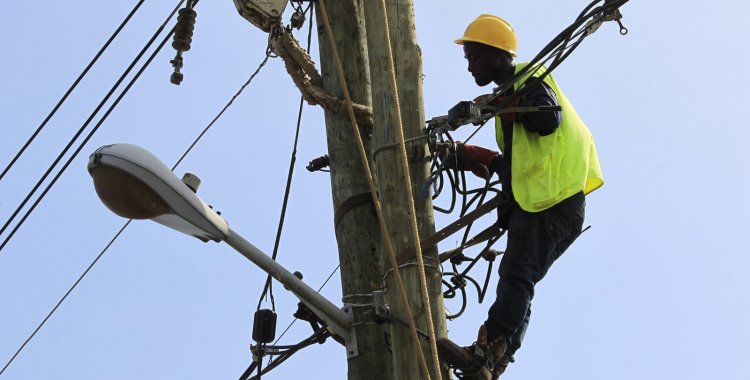"We have the great challenge of increasing the population's access to electricity, remembering that Angola has an access rate of 40 percent of the population," said João Baptista Borges.
The official was speaking at the virtual seminar "Angola+Green: Opportunities and Challenges of a green transition in Angola," one of 27 'Green Talks' dedicated to as many African countries, organized by the Portuguese presidency of the Council of the EU as part of the EU-Africa High Level Forum on Green Investment, scheduled for April 23.
The way Angola wants to take the "road to universal access to electricity" is by "diversifying the country's energy matrix," Baptista Borges noted.
"Recently we launched an important project that consists of the construction of about 300 megawatts [MW] of solar capacity, which will allow us to diversify the sources of our energy matrix and deal with the reality of long droughts, which affect the availability of water and energy," he said.
Another of Luanda's concerns is related to "training needs, capacity building and mainly the adaptation of technological solutions to the habits and customs of the population," said the minister.
"We need the experience of Portugal and other countries that are part of the European Union, which are in a more advanced state of development, with universal access to electricity, but with concerns of another nature in relation to environmental sustainability," he said.
Angola is interested not only in receiving the transmission of "good practices", but especially "solutions that can help to better regulate the field of access to renewable energy, to improve [its] legislation".
"We have a particular concern today with attracting private investment, considering that the State alone will not meet all the needs. But, for that, it is necessary that this be an attractive and safe business for the private investor", the minister stressed.
The Secretary of State for Foreign Affairs and Cooperation, Francisco André, who opened the seminar, referred that "the states' budgets are limited and partnerships are fundamental" to achieve the objectives set by the countries in the framework of the green transition and environmental sustainability.
"When we talk about green transition, we are not only talking about the environment, but also about economic and social opportunities within this global process of transformation and convergence," he added.
The Portuguese leader highlighted the opportunity provided by the new Neighborhood, Development Cooperation and International Cooperation Instrument (IVCDCI), with 79.5 billion euros for EU cooperation with third countries, approved in mid-March.
"The 'Global Europe', approved a few weeks ago during the Portuguese presidency, makes available for 2021-2027 an envelope close to 30 billion euros for Africa alone," and "around 30% of the almost 80 billion euros are destined to combat the effects of climate change," stressed Francisco André.
Appropriate legislation, "quality of regulation and the rule of law" are "extremely important" for access to these funds, and for the "leverage" of this potential investment, stressed the vice president of the European Investment Bank (EIB), Ricardo Mourinho Félix, who drew attention to the fact that "private investment" - "fundamental" to the green transition - is particularly sensitive to issues related to risk.
Pietro Toigo, representative of the African Development Bank (ADB) in Mozambique and Angola, also considered it "very important" that the "multilateral system" - the EU, EIB and European states its shareholders - "enable financial instruments for risk sharing of various kinds, allowing private capital to be mobilized, especially for the area of climate adaptation (...) and renewable energy in 'project finance' structures, which are very sensitive to perceptions of risk.
This speaker also warned of "a worrying trend of shareholders in the multilateral system withdrawing support for natural gas projects."
"We think that from the standpoint of the African continent, it might be a little dangerous to push [for] such a rapid transition," noted the AfDB representative.
"Natural gas is a relatively clean fuel compared to oil, and it can bring at the global level some gains in terms of emissions, replacing coal and oil-fired generation in emerging countries, in Asia, India and China," Toigo argued, noting that projects like the Mozambique Liquefied Natural Gas project-the largest project in the "project finance" model ever in Africa-can offer some developing countries the financial cushion to allow them to "invest in climate resilience" and the transition to economies based on renewable energy.
The Secretary of State for Internationalization closed the seminar with an invitation to Luanda to take advantage of the "green hydrogen" opportunity. "Angola has the opportunity to position itself as an African country with great conditions to develop good green hydrogen solutions from its territory," stressed Eurico Brilhante Dias.
"Portugal has been making this effort and has developed, even within the framework of the EU, projects of European interest in the framework of green hydrogen, it is a technology that we know, that we can share," proposed the Secretary of State, noting that green hydrogen is pointed out as the "support" of the "development of new maritime transport from renewable sources and is the backbone of international trade.
Water, waste, sustainable construction, services (in the area of energy certification, consulting), are "other priority areas, where there is 'know-how' and partnerships," in which Portugal bets on its relationship with Angola, said Eurico Brilhante Dias, drawing attention to "bilateral instruments" such as the Portugal-Angola Convention, whose 'ceiling' was increased "to 1.5 billion euros during the visit of the Prime Minister of Portugal to Luanda," in September 2018.







